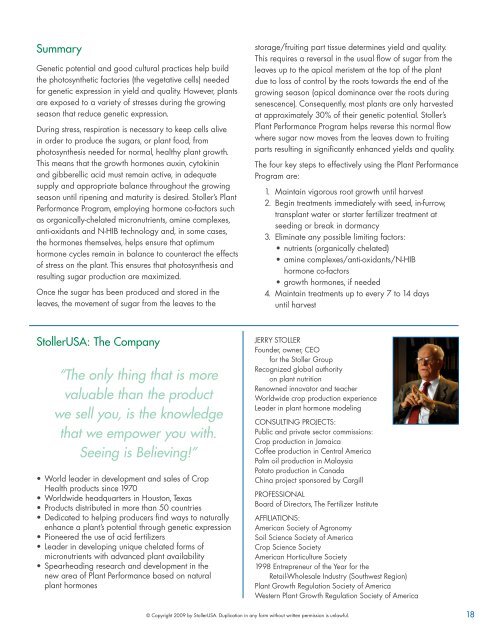You also want an ePaper? Increase the reach of your titles
YUMPU automatically turns print PDFs into web optimized ePapers that Google loves.
Summary<br />
Genetic potential and good cultural practices help build<br />
the photosynthetic factories (the vegetative cells) needed<br />
for genetic expression in yield and quality. However, plants<br />
are exposed to a variety of stresses during the growing<br />
season that reduce genetic expression.<br />
During stress, respiration is necessary to keep cells alive<br />
in order to produce the sugars, or plant food, from<br />
photosynthesis needed for normal, healthy plant growth.<br />
This means that the growth hormones auxin, cytokinin<br />
and gibberellic acid must remain active, in adequate<br />
supply and appropriate balance throughout the growing<br />
season until ripening and maturity is desired. Stoller’s <strong>Plant</strong><br />
<strong>Performance</strong> Program, employing hormone co-factors such<br />
as organically-chelated micronutrients, amine complexes,<br />
anti-oxidants and N-HIB technology and, in some cases,<br />
the hormones themselves, helps ensure that optimum<br />
hormone cycles remain in balance to counteract the effects<br />
of stress on the plant. This ensures that photosynthesis and<br />
resulting sugar production are maximized.<br />
Once the sugar has been produced and stored in the<br />
leaves, the movement of sugar from the leaves to the<br />
StollerUSA: The Company<br />
“The only thing that is more<br />
valuable than the product<br />
we sell you, is the knowledge<br />
that we empower you with.<br />
Seeing is Believing!”<br />
• World leader in development and sales of Crop<br />
Health products since 1970<br />
• Worldwide headquarters in Houston, Texas<br />
• Products distributed in more than 50 countries<br />
• Dedicated to helping producers find ways to naturally<br />
enhance a plant’s potential through genetic expression<br />
• Pioneered the use of acid fertilizers<br />
• Leader in developing unique chelated forms of<br />
micronutrients with advanced plant availability<br />
• Spearheading research and development in the<br />
new area of <strong>Plant</strong> <strong>Performance</strong> based on natural<br />
plant hormones<br />
storage/fruiting part tissue determines yield and quality.<br />
This requires a reversal in the usual flow of sugar from the<br />
leaves up to the apical meristem at the top of the plant<br />
due to loss of control by the roots towards the end of the<br />
growing season (apical dominance over the roots during<br />
senescence). Consequently, most plants are only harvested<br />
at approximately 30% of their genetic potential. Stoller’s<br />
<strong>Plant</strong> <strong>Performance</strong> Program helps reverse this normal flow<br />
where sugar now moves from the leaves down to fruiting<br />
parts resulting in significantly enhanced yields and quality.<br />
The four key steps to effectively using the <strong>Plant</strong> <strong>Performance</strong><br />
Program are:<br />
1. Maintain vigorous root growth until harvest<br />
2. Begin treatments immediately with seed, in-furrow,<br />
transplant water or starter fertilizer treatment at<br />
seeding or break in dormancy<br />
3. Eliminate any possible limiting factors:<br />
• nutrients (organically chelated)<br />
• amine complexes/anti-oxidants/N-HIB<br />
hormone co-factors<br />
• growth hormones, if needed<br />
4. Maintain treatments up to every 7 to 14 days<br />
until harvest<br />
JERRY STOLLER<br />
Founder, owner, CEO<br />
for the Stoller Group<br />
Recognized global authority<br />
on plant nutrition<br />
Renowned innovator and teacher<br />
Worldwide crop production experience<br />
Leader in plant hormone modeling<br />
CONSULTING PROJECTS:<br />
Public and private sector commissions:<br />
Crop production in Jamaica<br />
Coffee production in Central America<br />
Palm oil production in Malaysia<br />
Potato production in Canada<br />
China project sponsored by Cargill<br />
PROFESSIONAL<br />
Board of Directors, The Fertilizer Institute<br />
AFFILIATIONS:<br />
American Society of Agronomy<br />
Soil Science Society of America<br />
Crop Science Society<br />
American Horticulture Society<br />
1998 Entrepreneur of the Year for the<br />
Retail-Wholesale Industry (Southwest Region)<br />
<strong>Plant</strong> Growth Regulation Society of America<br />
Western <strong>Plant</strong> Growth Regulation Society of America<br />
© Copyright 2009 by StollerUSA. Duplication in any form without written permission is unlawful. 18


